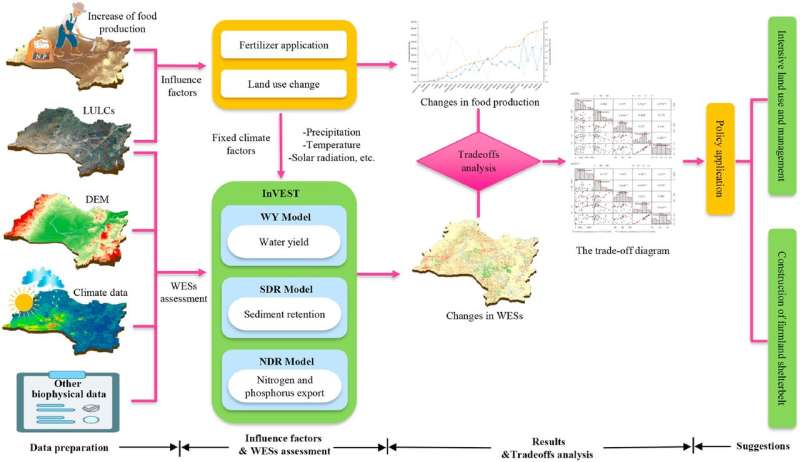Framework used for evaluating ecological impacts of food production. Credit: BAI Yang
With global population growth, accompanied by factors like COVID-19 and natural disasters, increasing food yield has become a major concern worldwide. However, the links between food production and local land-use driven water-related ecosystem services (WESs) changes remain underestimated and unrevealed.
In a study published in the Journal of Cleaner Production, Dr. Bai Yang from the Xishuangbanna Tropical Botanical Garden (XTBG) and his collaborators developed a spatio-temporal assessment framework to assess the impact of food production-driven land use change on WESs.
They also analyzed tradeoffs between food production and WESs provision, taking Songhua River Basin (SRB) as a case study.
They found that changes in land use led to changes in WESs. From 2000 to 2015, the area of forest, shrubland, and grassland in SRB all increased, while the area of cultivated land and wetland decreased.
Overall, the status of WESs declined slightly. Improving food production was thus based on sacrificing ecosystem services, posing potential ecosystem risks in SRB.
They then identified trade-offs between food production and water-related ecosystem services. Food production was negatively correlated with soil retention and positively correlated with water yield. There were significant positive correlations between food production and nitrogen and phosphorus export.
"We suggest a management strategy that combines intensification of land management with establishment of farmland shelterbelt, as part of a sustainable development path aiming at ensuring ecological protection and food security," said Dr. Bai Yang, corresponding author of the study.
More information: Shiliang Yang et al. Spatio-temporal changes in water-related ecosystem services provision and trade-offs with food production, Journal of Cleaner Production (2020). DOI: 10.1016/j.jclepro.2020.125316
Journal information: Journal of Cleaner Production
Provided by Chinese Academy of Sciences






















